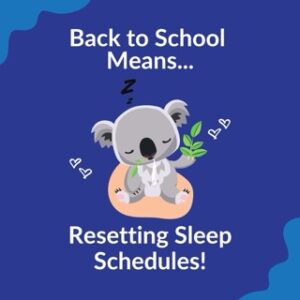 As the weeks of summer are winding down, many families are beginning to plan for the upcoming school year. This is an ideal time to look at your student’s sleep schedule and see if it might need some tweaking.
As the weeks of summer are winding down, many families are beginning to plan for the upcoming school year. This is an ideal time to look at your student’s sleep schedule and see if it might need some tweaking.
While sleep is imperative in mental, physical, social, and emotional development, kids often view it as more of a luxury than a necessity.
Kids today are busy. They often try to balance, school, extracurriculars, jobs, and friendships, leaving them short of getting the recommended amount of sleep their body needs.
While it can feel like an impossible task, adults and family pediatricians can be instrumental in highlighting the value of getting those ZZ’s and aiding your student(s) in developing a plan that is a fit for what they need to do and feel their best.
First and foremost, how much sleep do kids need?
According to both The Sleep Foundation and CDC:
School-aged children (6-12 yrs. old) 9-12 hours
Teens (13-18 yrs. old) 8-10 hours
Identifying where your student(s) fall is a great first step. Do not be surprised if they are not meeting the recommended amounts. Studies show that 60% of middle schoolers and 70% of high schoolers are falling short.
Why do they need it?
It is not surprising kids push back on negotiating bedtimes, even though it is in their best interest. Share with them some key benefits of getting the correct amount. Kids are more likely to make good choices when they are informed.
- Thinking and Academic Achievement.
Adequate sleep is a no-brainer when it comes to learning. Learning new content, whether it be school-related or otherwise requires adequate sleep so not only will they be alert and attentive but provide their brain with the opportunity to store memories. Adequate sleep is also a key factor in promoting analytical thinking and creativity.
2. Mood
Sleep resets mood. Haven’t we all at one time or another experienced the feelings that accompany a lack of sleep? Irritability, whining, and exaggerated reactions, to name a few. These feelings not only leave us feeling bad but can have a negative impact on our behavior towards others. As kids are navigating new social landscapes, this can be especially detrimental.
3. Physical Health and Development
Not only is sleep vital to almost every system in the body, but it also helps you grow.
Growth hormones surge during sleep and if the body isn’t getting enough, it could impact physical development. Sleep is also a key player in keeping your immune system at its best so they can do all they things they enjoy.
How do we reset a summer of late nights and late mornings?
The best way to reset a sleep schedule is gradually.
Start by getting kids into bed and waking them up 15 minutes earlier than where they are currently at and continue to gradually roll back bedtime in 15-minute increments every few days until they are on a sleep schedule that provides them with what they need.
Healthy Sleep Habits.
Once you outline the benefits of sleep for their overall health, assist them in incorporating these 5 habits to promote restful sleep.
- Develop a consistent sleep schedule with your student(s) that provides them with the hours they need and helps them stick to it.
- Avoid caffeine and energy drinks, especially in the afternoon and evening
- Limit screen time. Ideally, turn off electronic devices an hour before bed and store/charge phones outside of the bedroom.
- Encourage the connection of sleep and how the amount they are getting makes them feel.
- Create a restful environment. Keep their room cool, dark and quiet, and find bedding and pillows that feel good.
While the benefits of sleep extend beyond the few mentioned in this article, it is a realistic starting point for kids in building and incorporating manageable habits allowing them to learn, feel, and behave to the best of their ability.

References
Center for Disease Control (2020, September 10). Teenagers and Sleep: How Much Sleep is Enough? CDC Healthy Schools. Retrieved July 25, 2024, from https://www.cdc.gov/health
Natterson, C., MD, & Bennett, V. K. (2023). This Is So Awkward: Modern Puberty Explained (1st ed., pp. 116-127). Rodale Books.
Pacheco, D., & Vyas, N., Dr. (2023, June 1). Back to School Sleep Tips. SleepFoundation.org. Retrieved July 24, 2024, from https://www.sleepfoundation.org/school-and-sleep/back-to-school-sleep-tips
Suni, E., & Dimitriu, A., MD (2023, October 4). Teens and Sleep. SleepFoundation.org. Retrieved July 24, 2024, from https://www.sleepfoundation.org/teens-and-sleep
Sterni, L., MD, & Crocetti, M., MD., M.P.H. (n.d.). Teenagers and Sleep: How Much Sleep is Enough? Hopkins Medicine. Retrieved July 25, 2024, from https://www.hopkinsmedicine.org/health
